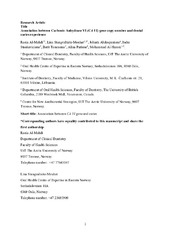| dc.contributor.author | Al-Mahdi, Rania Ali Muhsen | |
| dc.contributor.author | Stangvaltaite-Mouhat, Lina | |
| dc.contributor.author | Aleksejuniene, Jolanta | |
| dc.contributor.author | Stankeviciene, Indre | |
| dc.contributor.author | Tømmerås, Berit | |
| dc.contributor.author | Puriene, Alina | |
| dc.contributor.author | Al-Haroni, Mohammed | |
| dc.date.accessioned | 2023-03-16T12:50:39Z | |
| dc.date.available | 2023-03-16T12:50:39Z | |
| dc.date.issued | 2022 | |
| dc.description.abstract | The current study examined the association between the carbonic anhydrase VI (CA VI) copy number variations (CNVs) and dental caries experience in adults. In total, 202 of 35-72 years old subjects participating in the Lithuanian National Oral Health Survey (LNOHS) agreed to provide saliva samples, thus their data were included in the current study. Information about sociodemographic, environmental, and behavioural determinants was acquired via the self-administered World Health Organisation (WHO) questionnaire. Fluoride levels in the drinking water were recorded based on information provided by water suppliers. Dental caries experience was recorded by one calibrated examiner using the WHO criteria for recording caries on smooth (including proximal, buccal, and oral) or occlusal surfaces. Caries experience was measured as the total number of decayed (D3), missing (M), filled (F) surfaces (D3MFS). DNA was extracted from saliva samples to examine CA VI CNVs using the QX200 droplet digital PCR system. Negative binomial regression and Poisson regression analyses were employed for data analyses. Based on multivariable regression analyses, higher copy number of CA VI were associated with higher caries experience on smooth surfaces (IRR 1.04, 95% CI 1.005 - 1.08) and occlusal surfaces (IRR 1.02, 95% CI 1.003 - 1.04). Positive associations between higher copy number of CA VI and higher caries experience on smooth and occlusal surfaces were found, suggesting that the CA VI coding gene may be associated with caries development. Future studies are needed to validate our results and to examine the underlying mechanisms of such associations. | en_US |
| dc.identifier.citation | Al-Mahdi R, Stangvaltaite-Mouhat L, Aleksejuniene, Stankeviciene, Tømmerås, Puriene, Al-Haroni. Association between Carbonic Anhydrase VI (CA VI) gene copy number and dental caries experience. Caries Research. 2022 | en_US |
| dc.identifier.cristinID | FRIDAID 2096582 | |
| dc.identifier.doi | 10.1159/000528749 | |
| dc.identifier.issn | 0008-6568 | |
| dc.identifier.issn | 1421-976X | |
| dc.identifier.uri | https://hdl.handle.net/10037/28774 | |
| dc.language.iso | eng | en_US |
| dc.publisher | Karger Publishers | en_US |
| dc.relation.journal | Caries Research | |
| dc.rights.accessRights | openAccess | en_US |
| dc.rights.holder | Copyright 2022 The Author(s) | en_US |
| dc.rights.uri | https://creativecommons.org/licenses/by/4.0 | en_US |
| dc.rights | Attribution 4.0 International (CC BY 4.0) | en_US |
| dc.title | Association between Carbonic Anhydrase VI (CA VI) gene copy number and dental caries experience | en_US |
| dc.type.version | acceptedVersion | en_US |
| dc.type | Journal article | en_US |
| dc.type | Tidsskriftartikkel | en_US |
| dc.type | Peer reviewed | en_US |


 English
English norsk
norsk
